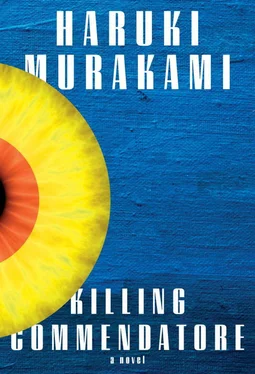“An exchange?”
“Between the two of us, you and me.”
I was silent. The meaning of the expression “an exchange” eluded me for a moment.
“We exchange parts of us with each other,” Menshiki explained. “I offer something of myself, and you offer something of yourself. It doesn’t have to be something valuable. It can be simple, like a kind of sign.”
“Like children exchange pretty seashells?”
“Exactly.”
I thought about this. “Sounds interesting, but the problem is I don’t have any nice seashells to offer you.”
“You’re not so comfortable doing it this way? Are you intentionally avoiding that kind of exchange? Is that why you don’t use live models? If that’s true, then I can—”
“No—that’s not it. I don’t use models because I don’t need them. That’s all. I’m not trying to avoid an interchange between people. I’ve studied painting for a long time, and have used live models more times than I can remember. If you don’t mind the drudgery of sitting still in a hard chair for hours at a time, I’m totally fine with you posing for me.”
“I don’t mind,” Menshiki said, spreading his palms up, lightly lifting them upward. “Then why don’t we commence the drudgery?”
—
We went into the studio. I brought over a dining room chair and had Menshiki sit in that. I let him assume whatever posture he wanted. I sat on an old wooden stool facing him (no doubt the stool Tomohiko Amada used when he painted), and started sketching with a soft pencil. I needed to decide on a basic approach of how I was going to reproduce his face on canvas.
“Is it boring to sit there? If you’d like, we could listen to some music,” I said.
“If it doesn’t bother you, I’d love to hear some music,” Menshiki said.
“Why don’t you choose something from the shelf in the living room.”
He spent about five minutes perusing the selection of records and returned with a four-disc boxed set of LPs of Georg Solti conducting a performance of Richard Strauss’s Der Rosenkavalier . The orchestra was the Vienna Philharmonic, the singers Régine Crespin and Yvonne Minton.
“Do you like Der Rosenkavalier ?” he asked me.
“I’ve never heard it.”
“It’s an unusual opera. The plot’s critical, of course, like with all operas, but with this one even if you don’t know the plot it’s easy to give yourself over to the music and be completely enveloped by that world. The world of supreme bliss Strauss achieved at the peak of his powers. When it was first performed, people criticized it as nostalgic, unadventurous even, where in reality the music is quite progressive and uninhibited. He was influenced by Wagner, but Strauss creates his own strange, unique musical realm. Once you get into this music you can’t get enough of it. I usually prefer Karajan’s or Erich Kleiber’s version, and have never heard Solti’s. If it’s all right with you, I’d like to take this opportunity to hear it.”
“Of course. Let’s listen to it.”
—
He placed the record on the turntable, lowered the needle, and carefully adjusted the volume on the amp. He went back to his chair, settled into a proper pose, and concentrated on the music flowing from the speakers. I did some quick sketches in my sketchbook of his face from several angles. His face was overall nicely put together, the features distinctive enough that I didn’t find it hard to capture the unique details of each. In the space of thirty minutes I completed five sketches from different angles. But when I examined them again, I was struck by an odd, helpless feeling. My sketches had accurately captured what was distinctive about his face, yet there was nothing about them beyond the sense that they were well-done drawings . They were all oddly shallow and superficial, devoid of depth. They were no different from caricatures drawn by some street artist. I tried doing a few more sketches, with basically the same result.
For me, this was pretty unusual. I had years of experience reconstructing people’s faces in a drawing, and flattered myself that I was good at it. Whether with a pencil or a paintbrush I could almost always come up with several mental images of what I was after with no trouble. I rarely struggled to decide on the composition of a painting. But now, with Menshiki as my model, not a single image came to me.
Perhaps I was overlooking something important. I couldn’t help but think that. Maybe Menshiki was adeptly hiding it from me. Or maybe it didn’t exist in him to begin with.
When the B side of the first of the four records in Der Rosenkavalier set finished I gave up, shut my sketchbook, and laid down my pencil. I lifted the needle, took the record off the turntable, and returned it to the boxed set. I glanced at my watch and sighed.
“I’m finding it very hard to draw you,” I admitted.
He looked at me in surprise. “In what way?” he asked. “Are you saying there’s some pictorial issue with the way I look?”
I shook my head slightly. “No, it’s not that. Of course there’s nothing wrong with your face.”
“Then what’s making it hard?”
“I wish I could tell you. It just feels that way. Maybe we still haven’t exchanged enough yet, as you put it. Haven’t traded enough seashells.”
Menshiki smiled, looking a bit perplexed. “Is there anything I can do to help?”
I stood up from the stool, went over to the window, and watched the birds flying over the woods.
“Mr. Menshiki, if it’s all right with you, could you give me a little more information about yourself? I know next to nothing about you.”
“Of course. I’m not trying to hide anything. No outrageous secrets or anything I’m trying to keep from you. I can tell you just about everything. What sort of information were you thinking of?”
“Well—for starters, I don’t even know your full name.”
“That’s right!” he said, looking a bit surprised. “Now that you mention it, you’re absolutely right. I was so caught up in talking I forgot to give this to you.”
He took a black leather holder from a pocket of his chinos and removed a business card. He handed me the card, and I read it. The thick white card simply read:

On the back was an address in Kanagawa Prefecture, a phone number, and an email address. That was all. No company name or title.
“The wataru in my name is the character that means ‘to cross a river,’” Menshiki said. “I don’t know why I was given that name. I’ve never had much to do with water.”
“The name Menshiki isn’t one you see very often.”
“I heard our family’s roots are in Shikoku, but I have no connection to Shikoku at all. I was born and raised in Tokyo, all my schooling was in Tokyo. And I prefer soba noodles to udon, which Shikoku is famous for.” Menshiki laughed.
“May I ask how old you are?”
“Of course. I turned fifty-four last month. How old do I look to you?”
I shook my head. “Honestly, I had no idea. That’s why I asked.”
“It must be this white hair,” he said with a smile. “People often tell me they can’t tell my age because of the white hair. You often hear about people whose hair turned white overnight because they were terrified. People often ask if that’s what happened with me, but I never had such a traumatic experience. I just tended to have a lot of white hair, ever since I was young. By the time I was in my mid-forties it was completely white. It’s weird, though, since my grandfather, father, and two older brothers are all bald. In the whole family I’m the only one who has completely white hair.”
Читать дальше












